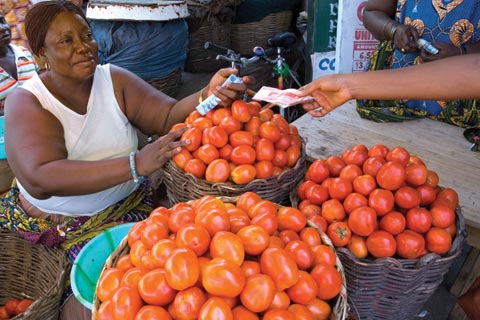Tapping women’s entrepreneurship in Ghana
Tapping women’s entrepreneurship in Ghana
 Selling tomatoes at a marketplace in Accra, Ghana: Women face many hurdles in expanding their businesses beyond the “micro” level.
Selling tomatoes at a marketplace in Accra, Ghana: Women face many hurdles in expanding their businesses beyond the “micro” level.“It has been a very long journey,” says Leticia Osafo-Addo, a business owner in Ghana. Her journey to success began nearly 30 years ago. She started off in her kitchen by making just 10 jars of black pepper sauce for friends. The chili sauce, popular in Ghana, is known as shito. Ms. Osafo-Addo’s was a success and demand for it grew. She sought and found additional training, including an integrated capacity-building programme initiated by the UN Conference on Trade and Development (UNCTAD) for promoting sustainable small- and medium-enterprises.
Moving the business out of her kitchen and into formal premises proved a long, challenging process. The biggest hurdle was securing capital. In 2001 she landed in debt due to delayed payment from her biggest client, the Ghana Armed Forces. But that year also proved to be a turning point. The Ghana Investments Promotion Centre facilitated the acquisition of 51 per cent of her company by an Austrian soup-making firm, increasing its value and thus enabling it to secure loans from two government ministries. That in turn meant she could refurbish a rented industrial site, and the factory opened in January 2006.
Stuck at the bottom
Ms. Osafo-Addo’s story of success is unusual. But her struggle is common to many of Ghana’s women entrepreneurs. About 80 per cent of women-owned businesses are stuck at the “micro” level. They are unable to expand because they lack properly coordinated support, cheap and long-term credit, and sufficient access to new technologies. They face poor infrastructure, low capacity and sometimes obstructive government policies.
According to World Bank estimates, most businesses in Ghana, which account for 70 per cent of employment in the country, fall within the categories of “micro,” “small” and “medium” enterprises. They range from farming activities, agribusiness, light manufacturing such as textiles and garments, and arts and crafts. However, due to neglect, this sector has suffered greatly over several decades, contributing to a nationwide shift from productive entrepreneurship to petty trading.
Because of such challenges, says Ms. Christy Banya, a programme analyst with the UN Development Programme (UNDP), the government should take firm action. “Local businesses need to be protected.”
She also notes that the banks appear more willing to give loans to importers of cheap products than to local manufacturers. The importers sell their produce quickly, at higher returns. But home-grown businesses require more time to turn a profit and to repay their loans, so the financial institutions shy away from them.
As in Ms. Osafo-Addo’s case, the challenge of finding much-needed capital has stalled the growth of Lucia Quachey’s clothing manufacturing company. Usually, commercial bank interest rates are high. Moreover, banks want collateral, which many women do not have.
Ghanaian women generally do not face problems in starting businesses on a subsistence basis. The difficulty has always been in developing them beyond that level, to graduate in scale from micro to small. This is where help is most needed. In an effort to address the issue, the government launched the Venture Capital Trust Fund to help invest in small- and medium-scale enterprises, known as SMEs.
Social handicaps
But women’s business groups worry that their members might not be able to tap into the fund. “At the end of the day, only big businesses will be able to access these funds, because the information doesn’t flow to the ground, where the majority of the women are illiterate,” says Ms. Quachey. “Resources may be available, but they may not be accessible to women at all, because culturally and socially, women are handicapped.” She cites women’s multiple roles. They are expected to look after the home and family, which impedes their progress in vocations outside the home.
In addition, Ghana’s prevailing social norms affect the ability of women-owned businesses to function as bigger, male-dominated businesses do. Many deals are conducted in hotels after business hours. In a country where women are still largely regarded as home-makers, the question frequently pops up: “What is a married woman doing in a hotel with some men?”
Ms. Quachey also cites prevalent “old boyism” in business circles. These are overwhelmingly male-dominated, and there are simply too few women at the top to encourage other women to strive to break in.
Ms. Gifty Boahene, chief executive officer of Fairgreen Ltd., an information technology company, believes that times are changing and that perceptions of women doing business outside the home will change as well. But she adds: “We are not there yet. I have seen married women who had to go out of their way to introduce their male business colleagues to their husbands,” to reassure the husbands that their relationships were strictly professional. Some marriages simply fall apart.
Time for reform
Ghana’s political history has not been encouraging for entrepreneurship in general. Decades of military rule in the 1970s and 1980s drove away many local and foreign entrepreneurs. Now, with a stable political atmosphere and the goodwill that the country enjoys with the international community, industry activists are hoping the government will implement policies to encourage business growth. Such an approach could help create a shift from subsistence to micro businesses, from small to medium and from medium to large. This would in turn provide many opportunities for women-owned businesses to grow and flourish.
A wind of change may already be blowing in favour of women-owned businesses. The government, with donor support, is also implementing a programme of market reforms. The goal is to achieve widespread private-sector growth throughout the country by enhancing competitiveness and reducing the risk of doing business in Ghana. Although these reforms do not specifically target women-owned businesses, their nature should eventually promote women’s entrepreneurship.
“Establishing practical and workable legislation is an essential part of assisting and encouraging women to consider starting and running their own business,” says Mr. Patrick S. Frederick, head of a UK-based business consulting agency and co-founder of the African-Caribbean Business Network, who was quoted in a local magazine. “This is a hugely under-tapped resource that should be addressed and not overlooked.”






















